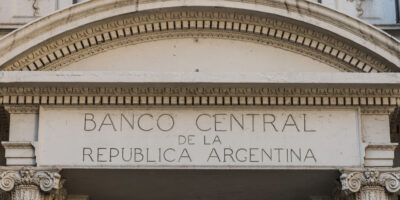Fed’s “Normalizing” in the Spirit of Cato’s Buchanan Brigade
It’s not systemic reform, but the Federal Reserve’s recent indication of climbing down from its $4.5 trillion balance sheet is being met with at least half smiles by free market economists.
Release of the March minutes from the Federal Open Market Committee dovetails with the release of a book from the Cato Institute containing 30 essays urging consideration of new paths after years of easy monetary policy. The Fed’s new direction is something anticipated and encouraged by George Selgin, who wrote the foreword to “Monetary Alternatives: Rethinking Government Fiat Money,” notes James Dorn, the volume’s editor.
“The strategy seems to be to first increase the policy rate, maybe twice more this year, then start slowing the reinvestment of maturing securities,” said Dorn, vice president for monetary studies at Cato as well as editor of its Cato Journal. Selgin “has supported such a move to help normalize monetary policy.”
“Many of us have wanted them to shrink for a long time,” said Walker Todd, a visiting economics and finance lecturer at Middle Tennessee State University, trustee of the American Institute for Economic Research, and adjunct scholar at Cato whose article “The Fed’s Failed Policies” is scheduled to appear in the Cato Journal’s spring/summer edition. “A lot depends on how they do it.”
“Normalization” rings well in free market economists’ ears, although contributors to “Monetary Alternatives” write about more profound changes such as a formal “monetary constitution,” competing currencies, and establishing a new gold standard, Dorn wrote in a Cato release announcing the book’s publication. Speaking to one divide among free market economists, Dorn said, “Our natural allies are anyone who believes in the quantity theory of money. Thus the differences between the free banking people and monetarists are small potatoes compared to the differences with the interest-rate mindset of the Keynesians.”
Cato’s book includes an essay by James Buchanan, long associated with the monetarist free market tradition. Winner of the 1986 Nobel Prize in economics, Buchanan was also a senior distinguished fellow at Cato. Buchanan’s essay is titled “Reductionist Reflections on the Monetary Constitution.” In writing on monetary constitutions at various times, Buchanan envisioned the possibility of designing legal institutions to restrain central banks’ excesses. In the afterglow of Republican Ronald Reagan’s 1980 election, Buchanan encouraged formation of a presidential commission to study the Federal Reserve’s history and legitimacy. Arthur Burns, who was named Fed chairman by President Richard Nixon in 1970 and had a long history advising Republican politicians, quashed the idea. Buchanan said Burns “would not have anything to do with any proposal that would challenge the authority of the central banking structure.”
Buchanan’s commission idea has gotten new life with Representative Kevin Brady (R-Texas) filing a bill in 2015. Brady’s HR 2912, introduced to the House Financial Services Committee, would establish a commission to examine U.S. monetary policy, evaluate alternative monetary regimes, and recommend a policy for monetary policy going forward, the bill’s text states. Brady is chairman of the House Ways and Means Committee, one of the most powerful panels on Capitol Hill.
Buchanan sounded warnings about unsound money. Most economists say unsound money has played a role in bouts of inflation and recessions at least since 1971, when President Nixon eliminated the last remnant of the gold standard, which had chiefly guided U.S. monetary policy prior to the Fed’s creation in 1913.
“The dollar has absolutely no basis in any commodity base, no convertibility,” Buchanan wrote in comments published in Economic Education Bulletin 28. “What we have now is a monetary authority that essentially has a monopoly on the issue of fiat money, with no guidelines that amount to anything; an authority that would never have been legislatively approved, that never would have been constitutionally approved on any kind of rational calculus.”
Although best known for his public-choice works, monetary reform was something Buchanan “definitely cared” about and was turning his attention back to shortly before his death in 2013, said Tyler Cowen, an economist influenced by Buchanan whose relationship included being faculty colleagues at George Mason University. Since 1998, Cowen has been general director of the James M. Buchanan Center for Political Economy.
The role of central banking in business cycles has long been a hot topic with the modern Austrian school of economics, most prominently represented by F.A. Hayek, who taught at the University of Chicago, and Ludwig von Mises. Hayek and Mises saw central banks as the chief culprit, while others, including Burns’ mentor, Wesley Clair Mitchell, saw the major causes as being often different. Some defenders of central banking point out that there were business fluctuations prior to the Fed’s creation.
The topic is likely to animate Cato’s annual monetary conference, which is celebrating its 35th anniversary this year. Cato is setting an impressive intellectual table ahead of the November 16 invitation-only conference by centering it on Dorn’s book.
More broadly, the think tank takes thought-provoking positions critical of central banking such as this: “Cryptocurrencies, like bitcoin, offer the possibility of a private non-commodity monetary base and the potential to realize F.A. Hayek’s vision of competitive free market currencies. Ongoing experimentation and technological advances may pave the way for the end of central banking—or at least the emergence of new parallel currencies.”
Cato established its Center for Monetary and Financial Alternatives in 2014, saying more recently that it was inspired by Buchanan’s ethos that there is a “moral obligation to think that we can improve things.” “Monetary Alternatives” contributor Selgin, a follower of much of Hayek’s thought, was in at the birth of the center, having left his post as a University of Georgia economics professor to become its director. Selgin has also been an AIER summer fellow.








